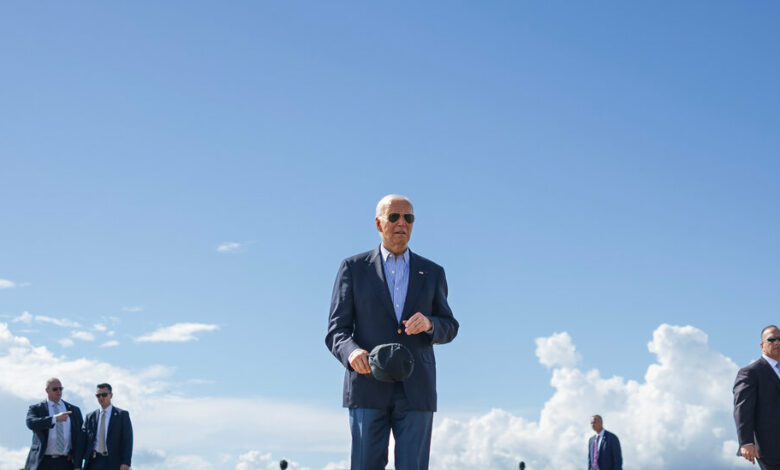Crisis? What Crisis? Biden Rejects Democratic Pessimism

Everything sounds good in President Biden’s world. That devastating debate? Just a bad night. Those bleak polls? Just plain wrong. The bleak election predictions? The same old doomsayers, wrong again. The Democrats who want him to withdraw? No one told him that.
For Mr. Biden, the crisis that so many Democrats who are not on his payroll — and some who are — see as nothing more than a bump in the road, an obstacle to overcome, as he always does. He does not accept that he is declining as he ages. He does not accept that he is losing to former President Donald J. Trump. He does not believe that many in his own party want him to step aside.
His prime-time interview, aired Friday night on ABC News, was an exercise not just in damage control but also in reality checking. For much of his long and storied political career, Mr. Biden has succeeded through sheer force of will, braving the doubters, skeptics and scofflaws to prove he could do what no one expected. But now, in perhaps the most threatened moment of his presidency, that self-confidence is increasingly isolating him within his own party.
“You really see a president in denial and in a bubble,” Julián Castro, a former housing secretary who ran against Biden for the Democratic nomination in 2020, said in an interview. “You want a president who can honestly and accurately assess his viability in this race, and that interview didn’t inspire confidence at all that he has a good sense of that.”
David Axelrod, a former senior adviser to President Barack Obama who has long expressed concerns about Biden’s decision to run again, said the president was rightly proud of his record. “But he’s dangerously disconnected from the concerns that people have about his ability to move forward and his position in this race.” he wrote on social media.
Mr. Biden’s performance in the 22 minute session with George Stephanopoulos was not viewed as disastrously as his debate against Trump eight days earlier. But while his most loyal supporters likely found enough reassurance to stick with him, those who had turned against him or were on the verge of doing so did not appear reassured, and time is running out if the party is to change its nominees, as some would like.
Though Mr. Biden’s face was flushed this time around and he looked calm and collected, hands in lap and legs crossed, he again sounded hoarse and at times hesitant, sometimes struggling to finish a sentence. He was dismissive of concerns about his health, denied that he was more frail and dodged questions about medical tests.
He repeatedly took responsibility for his performance in the debate — “nobody’s fault but mine” — but then blamed it on exhaustion and illness and Mr. Trump “yelling” and distracting him. Still, he said he didn’t know whether he actually watched a recording of the debate. He said he has a cognitive test every day because he “runs the world” and that he would only step aside as a candidate “if the Lord Almighty came down and said, ‘Joe, get out of the race.’”
Perhaps the line that most irritated fellow Democrats was his response when Mr. Stephanopoulos asked Mr. Biden how he would feel if he lost to Mr. Trump in January and had to hand the White House back to the former president. “I will feel that way, as long as I did everything I could and did the best job I could do, that’s what matters,” Mr. Biden replied.
Several Democrats voiced their anger afterward, declaring that the election wasn’t about winning a participation trophy but about stopping a convicted felon from trying to overturn an election he lost. They called for “terminating” the Constitution to put themselves back in power and vowed to spend his next term exacting “retribution” on his opponents. One House Democrat, who spoke on condition of anonymity for fear of repercussions, said he hoped the Lord Almighty would come talk to Biden soon.
Every president lives, to some extent, in a bubble of his own making, insulated from the outside world in a fortress on Pennsylvania Avenue, surrounded by a phalanx of aides and Secret Service agents, and reassured by allies of his unique importance in the world. Mr. Biden decided to run for reelection, even though he would be 86 at the end of a second term, after convincing himself that he alone could defeat Mr. Trump.
A dozen Democratic lawmakers and strategists contacted after the ABC interview expressed serious doubts that he could beat Mr. Trump on this issue. But whether they told Mr. Biden personally was less clear. Friends of presidents shy away from delivering the hardest news directly, often trying to deliver such messages through the news media, where they can be ignored, or through aides who may or may not deliver them in full.
If the message hasn’t gotten through in private, it could get louder in public. One Democrat who works for the party predicted that more elected officials would call on the president to step aside. Another Democratic ally in the White House said the interview had not resolved the issue and amounted to a stay of execution for Mr. Biden. Both spoke on condition of anonymity because of the sensitivity of the situation.
“This interview was necessary, but not sufficient,” said Paul Begala, a leading Democratic strategist. “It will not quell the growing anger and resentment among Democrats. Nothing short of President Biden doing a Simone Biles triple flip with a double twist will ensure that Democrats no longer see that debate.”
For many Democrats who are fond of the president, the interview was painful to watch. Mr. Stephanopoulos was respectful and professional, but repeatedly pressed Mr. Biden to ask the tough questions that no octogenarian wants to ask about his own mental acuity and future capabilities.
At one point, Mr Stephanopoulos even appeared to offer Mr Biden a dignified way out, but the president rejected it.
“The overwhelming sentiment is this,” Mr. Stephanopoulos said of Democrats. “They love you and they will be eternally grateful to you for beating Donald Trump in 2020. They think you’ve done a great job as president, many of the successes you’ve outlined. But they’re worried about you and the country. And they don’t think you can win. They want you to go out gracefully, and they’ll cheer you on if you do. What do you say to that?”
“I say the vast majority is not where those — those people are,” Mr. Biden responded, ignoring polls showing that about half of Democrats say he should withdraw. “I have no doubt there are people.” He then compared the current situation to the uncertainty about his ability to win four years ago. “The same thing happened in 2020,” he said, then mimicked the pessimists. “‘Oh, Biden, I don’t know. Man, what’s he going to do? He could take me down.’”
Mr. Stephanopoulos said he had never seen a president reelected with a 36 percent approval rating. “Well, I don’t believe that’s my approval rating,” Mr. Biden said. “That’s not what our polls show.”
The White House understood that a single interview would not by itself resolve the crisis over the debate. But Mr. Biden and his aides had hoped that it would at least stabilize the situation and slowly rebuild trust, along with meetings like the one he held Friday in Wisconsin and a news conference at next week’s NATO summit in Washington.
Biden has been written off so many times over the past half-century that he has a preternatural faith in his own ability to bounce back from any setback. He sees himself as a long-term player, calm in the face of the tumult around him. In recent days, he has sounded surprisingly measured to friends who have spoken to him, even as he acknowledges the challenges he faces.
Biden now heads into a weekend in which his fellow Democrats will decide what to do next. Some Democratic lawmakers and major donors are organizing efforts to pressure the president to drop out of the race or reconsider his approach. The president’s time on television Friday appears unlikely to prevent that.
“I can’t imagine it’s going to do much, if anything, to calm the nerves of Democrats on Capitol Hill,” said Jim Manley, a former top adviser to Senate Democrats. “We’re going to have a tough few days.”




